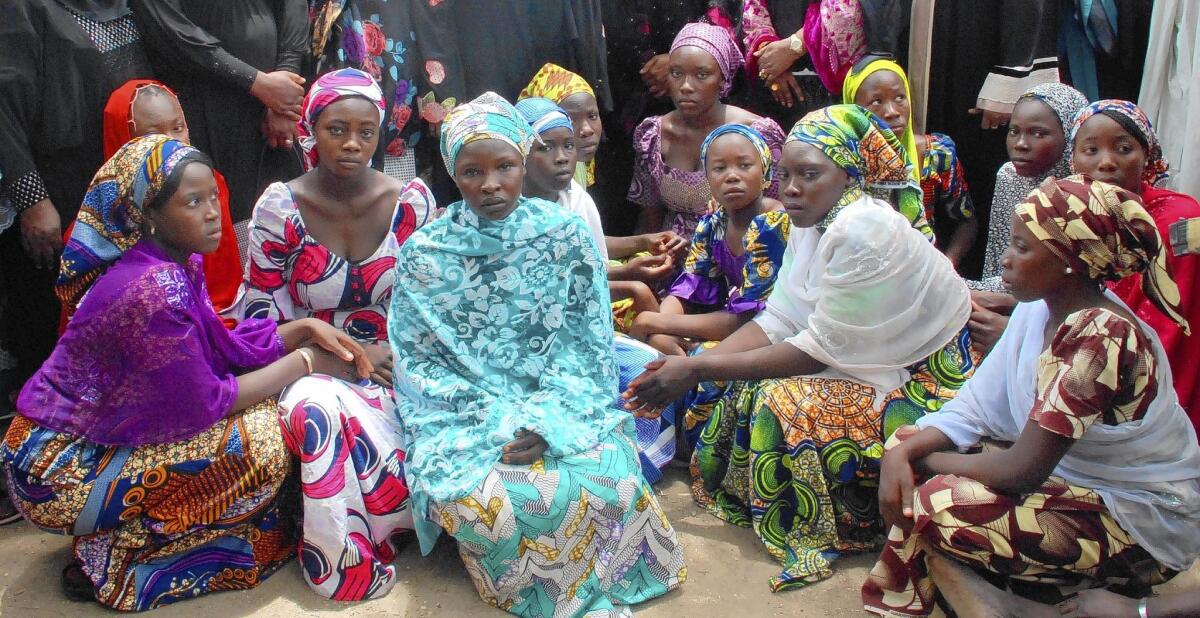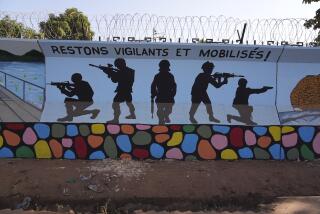Nigerian schoolgirls recall Boko Haram kidnapping

- Share via
reporting from KANO, Nigeria — Escape seemed hopeless. The militants’ convoy of pickup trucks, buses and motorcycles penetrated deep into the northeastern Nigerian forest in the dead of night with its haul: several hundred schoolgirls.
A phalanx of motorcycles puttered on either side, with men wielding AK-47s ready to shoot any girl who tried to jump from a truck and run.
The first thing the Boko Haram insurgents did when they stopped to camp in the forest near a village called Baale was put some of the girls to work cooking looted food. Others were taken at gunpoint to carry water.
“I was one of those chosen to cook,” a 16-year-old said in a phone interview, recalling the kidnapping last month of more than 300 girls at a boarding school in Chibok.
The girl said her mind raced as she stirred the pot of rice over a wood fire. The Boko Haram gunmen had the group surrounded, constantly watching.
“My mind was busy, thinking of a way to escape,” she said. “I and two other girls were close together, speaking softly, and we came up with a plan.”
The girls told the gunmen they needed to relieve themselves. They were allowed to walk into the bush.
“As soon as we were out of sight of the gunmen, we fled and we ran for about two hours,” the girl said.
Eventually, the three stumbled across a group of Fulani herders, who rescued them.
According to police, 53 girls had escaped from the gunmen as of Friday, and 276 remained missing. Officials in Borno state, where Chibok is located, identified the girls who had escaped, saying some had fled on the day of the kidnapping, and others got away later.
Boko Haram, which modeled itself on Afghanistan’s Taliban, bitterly opposes secular education and Western culture. It has carried out dozens of school attacks since 2012, killing scores of students and teachers. It has closed nearly all the schools in Nigeria’s vast northeastern desert region and wants to establish Islamic sharia law throughout Nigeria, a country of 170 million divided between the predominantly Muslim north and mainly Christian south.
In an attack in Yobe state in February, 43 students died when gunmen raided a boarding school at night, seizing males and cutting their throats or hacking them to death. Others were locked into their dormitories and burned to death when the extremists threw in firebombs.
Nigerian media showed images of the bodies of teenage boys in snow-white shirts, lying on sandy ground soaked with their blood, some of them curled up as if sleeping.
In July, 42 students and teachers were killed in another attack on a Yobe school. Forty more died in September in an attack on an agricultural college in the state when gunmen burst into dormitories and opened fire as students slept.
Despite the atmosphere of terror at schools, hundreds of girls had gathered in Chibok for a few days in April to take exams. They woke the night of April 14, terrified, when gunfire broke out in the distance. The crackling moved closer, and two hours later, dozens of men in camouflage drove into the school compound in pickup trucks and buses and on motorcycles.
Many girls thought they’d been saved.
“We thought they were soldiers,” a 17-year-old said in a phone interview. “They told us to get out of our hostels, saying that they had been sent to take us to safety because Boko Haram was attacking the town.”
Outside, the girls watched, puzzled, as the gunmen broke into a school kitchen, grabbing pots and utensils.
“Suddenly they began to chant ‘Allahu Akbar’ [God is great] as they set the school buildings on fire,” the girl said. “That was when we realized we were in the hands of Boko Haram. It was too late to contemplate escape, because we could see from the expression on their faces that they were ready to shoot any of us who tried to flee.
“They forced us into trucks, buses and cars, some of which were loaded with foodstuffs and petrol. They took us in a convoy into the bush,” she said.
With gunmen on motorcycles flanking the convoy, it was impossible to jump off the truck and flee, she said.
The journey didn’t go smoothly. One of the trucks broke down. The gunmen ordered girls to cram into another truck, burned the disabled vehicle and continued on. Next, one of the buses broke down.
“At that moment, some of us jumped out of the vehicles and ran into the bush,” the 17 year-old said.
Boko Haram’s mass abduction of the girls — more than in any of its other many attacks during the last decade, some of which have seen hundreds of people die — sparked international disgust. Boko Haram leader Abubakar Shekau galvanized the disdain with a chilling boast: “I abducted your girls. I will sell them in the market, by God.”
Amid a global Twitter campaign, #BringBackOurGirls, supported by celebrities such as Mia Farrow and Angelina Jolie, leaders in the United States, Britain and France offered to help recover the abductees.
Human rights groups have accused Nigeria’s military of a scattershot response to Boko Haram’s attacks, often killing civilians. It has also been accused of shooting suspected members of Boko Haram without arrest or trial, failing to protect northeastern communities and being slow to respond to reports of Boko Haram activity.
Enoch Mark, whose daughter and two nieces were taken by the gunmen, said in a phone interview that the people of Chibok waited three days for the military to help.
“Three days after the kidnapping, when we realized nothing was being done to rescue our daughters, we parents mobilized hundreds of residents from Chibok and neighboring villages, including vigilantes, and went after the kidnappers in the forest, on motorcycles,” Mark said.
The villagers collected money for gasoline and armed themselves with sticks, knives, machetes and hunting guns. The group traveled 60 miles to Baale. Residents there told them the Boko Haram group had passed through the village with the girls and they were camped near a creek nearby.
Gunmen had escorted girls to the village to collect water, never letting them out of sight, villagers said.
“The villagers begged us not to proceed, saying we’d be killed because our sticks and hunting guns were no match for the heavy weapons of the Boko Haram gunmen. They warned us we would all be killed if we dared to confront the gunmen. They said we’d put the lives of our daughters in danger,” Mark said.
It was growing dark. The men, frustrated and afraid, turned back, hoping to return later with army support.
“We had to return because there was nothing we could do. It was a long trek. We got home after sunset,” said another father, Yakubu Maina, in a phone interview.
The next day, the group approached a military barracks in Bama, 42 miles southeast of Maiduguri, the capital of Borno state. The military commander told them to put their report in writing, but nothing was done.
“Had the military acted promptly on that information, our daughters would have been saved,” said Pogu Bitrus, leader of the Chibok Elders Forum.
Nearly three weeks passed before President Goodluck Jonathan spoke publicly about the case, promising to recover the girls but acknowledging that authorities had no idea where they were.
The education commissioner in Borno state, Musa Inuwa Kubo, said in a phone interview that the military was doing all it could.
“You have to be very careful in your approach so as not to risk the safety of these girls you want to rescue,” Kubo said.
Mark said the villagers had appealed to Boko Haram to free the girls, without success.
Community vigilante groups that have sprung up in the last year to try to protect villages and towns in the northeast have complicated relations with Boko Haram. The group’s attacks often target villages where vigilantes are active.
“This is a nightmare for us. We keep imagining the worst could happen to our daughters. Shekau’s announcement that he’s going to sell them as slaves confirmed our worst fear,” said Maina, the father of an abducted girl.
Bitrus, the elder, said his group had received information from communities across the border in Cameroon that Boko Haram had passed through with the girls. Some had reportedly been taken to Chad.
He said there were reports that the girls had been sold as “brides” for $12 each.
“What surprises us is the indifference of the military, which did nothing to intercept the kidnappers in their movements from one town to the other with our girls,” Bitrus said. “The free movement of the kidnappers in a huge convoy with their captives for two weeks without being traced by the military, which claims to be working diligently to free the girls, is unbelievable.”
Maina said the village of Chibok was in mourning.
“My grief is deep,” he said. “I’d rather my daughter was dead than face this horror.”
Special correspondent Abubakar reported from Kano and Times staff writer Dixon from Johannesburg, South Africa.
More to Read
Sign up for Essential California
The most important California stories and recommendations in your inbox every morning.
You may occasionally receive promotional content from the Los Angeles Times.










